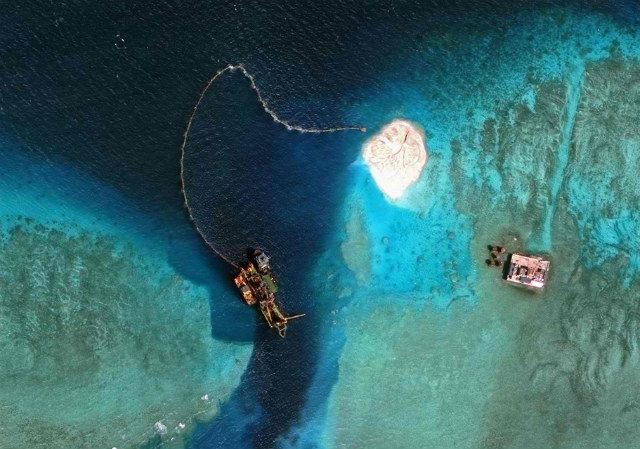'Vietnam has indisputable sovereignty over the Paracel and Spratly archipelagos,' the Vietnamese ambassador tells Rappler

VIETNAM CONSTRUCTION. This satellite image shows Vietnam's reported construction activities on Sand Cay, one of the features of the Spratly Islands in the disputed South China Sea. Photo courtesy of SIS Asia Maritime Transparency Initiative/DigitalGlobe
In an e-mail to
Rappler, Vietnamese Ambassador to the Philippines Truong Trieu Duong said,
"Activities conducted by Vietnam
as you mentioned are wholly aimed at improving the old physical facilities in
order to serve the minimum daily needs of the people living in islands which
are under the jurisdiction of Vietnam
These activities,
which Rappler mentioned in an earlier e-mail to Duong, involve the construction
reported by the Washington-based Center for Strategic and International Studies
(CSIS) on May 7.
Using satellite
imagery, the CSIS' Asia Maritime Transparency Initiative said it confirmed that
Vietnam "has engaged in
land reclamation in recent years" on Sand Cay and West Reef, two features
in the Spratly Islands
in the South China Sea .
The CSIS said
these satellite images reveal the following:
"That in the
last several years, Vietnam has added approximately 65,000 square meters to
West Reef and 21,000 square meters to Sand Cay. It has also developed its
military facilities at Sand Cay."
"By
comparison, in the last year, China
"According
to US government officials, China has now reclaimed over 2 million square
meters of new land, while Vietnam
Duong pointed out
that the CSIS report "is not totally accurate." He didn't describe
their construction activities as "land reclamation" as the CSIS did.
"In fact,
Vietnam has several times embellished some of the islands which are under its
jurisdiction, but in a very small scale, mostly constructing ridges against
shoreline erosion; building a dock and wharf; (and providing) logistics for
fishing services. Our construction and embellishment do not change the status
quo," the ambassador said.
The Philippines ' Department of Foreign Affairs (DFA)
on Monday, May 11, said it was verifying Vietnam
The CSIS report
came as the Philippines
protests China 's reclamation
activities in the South China Sea and, at the same time, seeks a stronger alliance
with Vietnam in the face of
an aggressive China
'Indisputable
sovereignty'
Responding to
Rappler's questions, the Vietnamese ambassador pointed out that his country's
construction in the South China Sea is unlike China
For one, Duong
said, "Vietnam
Because of this,
he said Vietnam 's activities
in Spratly and Paracel Islands in the South China Sea
"are completely legitimate and normal."
In line with the
DOC, Vietnam
Duong said:
"Vietnam has resolutely
expressed its opposition to all acts violating the sovereignty, sovereign
rights, and jurisdiction of Vietnam
in the South China Sea . It also requests all
parties concerned to exercise restraint, without altering the status quo,
destroying the marine environment, threatening peace, stability, freedom of
navigation, and aviation in the region."
He added that
Vietnam has "repeatedly requested all parties concerned to comply fully
with the DOC and the relevant provisions of international law, particularly the
United Nations Convention on the Law of the Sea in 1982," the so-called
"Constitution for the Oceans."
'Contrary
to Vietnam
Duong, however,
said Vietnam 's activities
shouldn't be compared to China
"China , contrary to Vietnam
The ambassador
added: "Such activities will have serious impact that will change the
geographical status quo, affect marine environment in the South
China Sea . The scale and purposes of China ’s
activities are totally different from what Vietnam
The Philippines ' Bureau of Fisheries and Aquatic
Resources earlier said China 's
reclamation has buried 311 hectares of coral reefs, or 5 times the size of Rizal Park
in Manila
Reports on Vietnam 's construction activities come as the Philippines and Vietnam
In May 2014,
Duong said in an interview with
Rappler that the Philippines
and Vietnam
He also said that
to keep peace and stability in the South China Sea, the Philippines and Vietnam China
http://www.rappler.com/nation/93189-vietnam-construction-south-china-sea

No comments:
Post a Comment
Note: Only a member of this blog may post a comment.